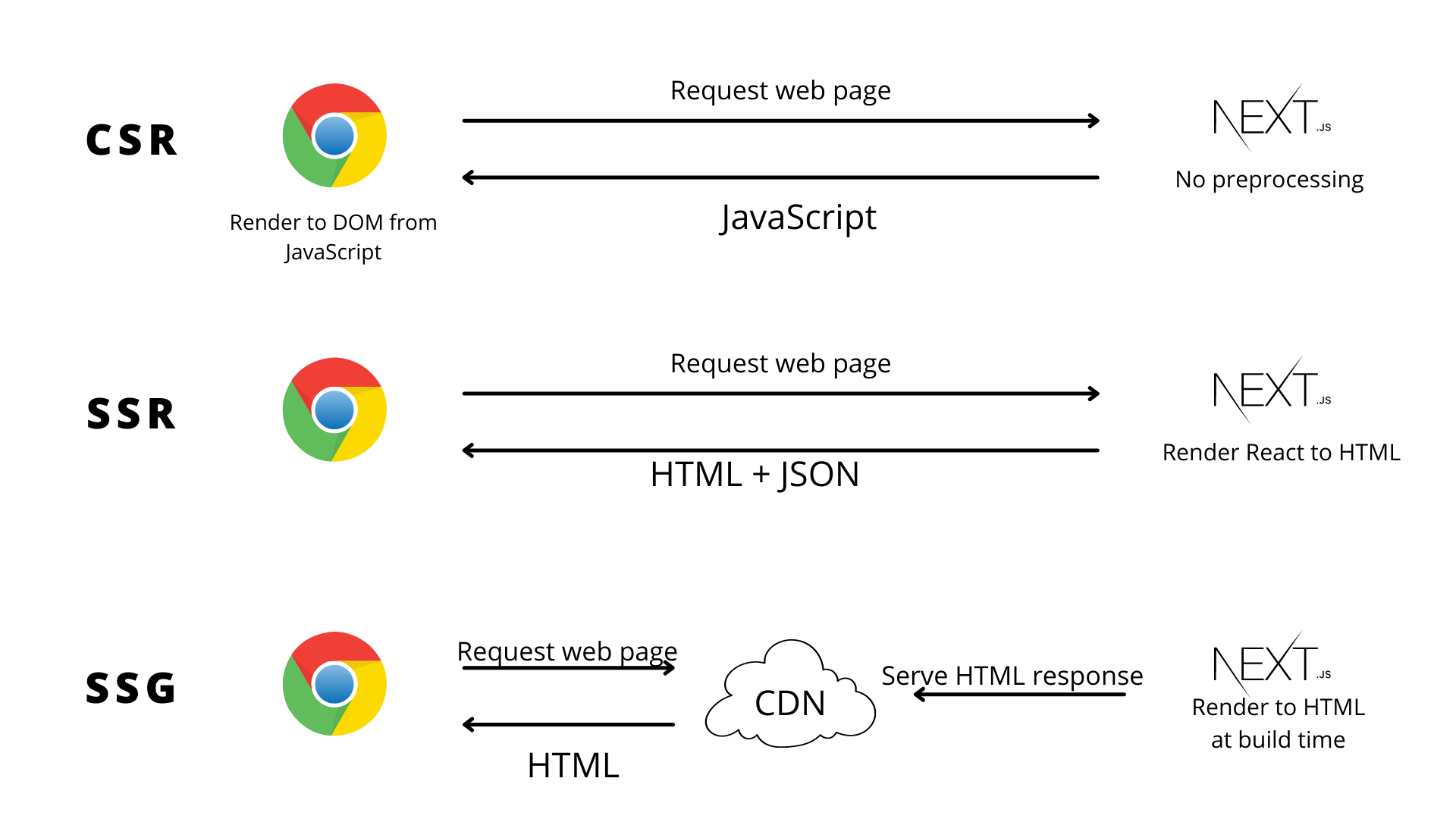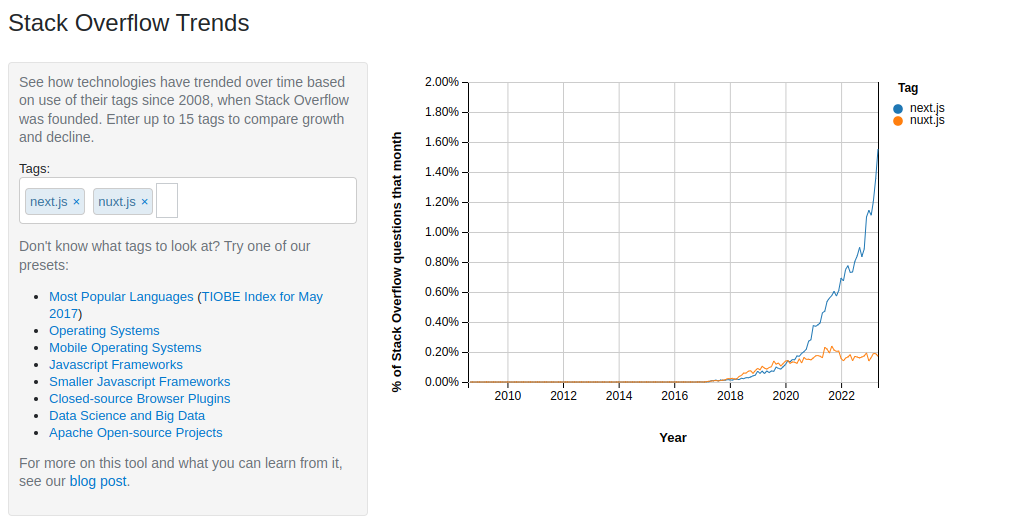Nuxt.JS vs Next.JS: Evolution of Modern Web Development

In today's website development two frameworks have emerged as prominent players, revolutionising how developers create interactive and high-performing web applications. Next.js and Nuxt.js, built on top of React and Vue.js, respectively, have garnered substantial attention for their unique features and capabilities.
In this comprehensive comparison, we will explore the strengths and weaknesses of both frameworks, shedding light on their evolution, use cases, and the latest developments surrounding them.
Next.Js: The Champion
Next.js has established itself as a powerhouse in modern web development, revolutionising developers' creation of interactive and high-performing applications. With its cutting-edge features and relentless pursuit of innovation, Next.js has pushed the boundaries of what is possible in web development, earning a well-deserved reputation as a leading framework in the industry.
So What's Great About Next.js

Server-side rendering (SSR): Next.js enables the server-side rendering of React components, enhancing performance and SEO capabilities.
Static site generation (SSG): Next.js allows for generating static HTML files at build time, resulting in faster content delivery and reduced server load.
Automatic code splitting: Next.js automatically splits code based on page routes, improving performance and reducing initial load times.
Built-in CSS support: Next.js offers comprehensive support for CSS modules, CSS-in-JS libraries, and global styles, simplifying the styling process for developers.
Optimised routing: Next.js provides a seamless and intuitive routing system, making dynamic route creation a breeze for web applications.
Expansive plugin ecosystem: Next.js boasts extensive plugins and extensions, enriching its functionality and enabling seamless integrations.
So Who is Using Next.js

Universal web applications: Next.js is ideal for building universal apps like Hulu, Binance and Invision that need server-side rendering for better performance.
Static websites: Next.js's static site generation feature is well-suited for creating content-heavy websites with dynamic elements.
E-commerce platforms: Next.js powers e-commerce platforms, leveraging SSR capabilities for improved SEO and faster loading times.
Scalable applications: Next.js scales effortlessly, allowing businesses to handle high-traffic loads efficiently.
Nuxt.Js: The Challenger

Key Features of Nuxt.js

Server-side rendering (SSR): Nuxt.js leverages server-side rendering of Vue.js components, resulting in improved initial load times and SEO performance.
Automatic routing: Nuxt.js automatically generates routes based on file structure, reducing manual configuration and simplifying development.
Middleware support: Nuxt.js enables developers to define middleware functions, allowing for request modifications before rendering pages and providing added flexibility.
Static site generation (SSG): Nuxt.js offers the option to generate static HTML files, enhancing performance and an excellent user experience.
Modular architecture: Nuxt.js adopts a modular architecture that promotes code organisation and reusability.
Better developer Experience: Several developers on Stackshare swear by Nuxt, this is probably its biggest strength.
Use Cases for Nuxt.js

SEO-friendly websites: Nuxt.js's server-side rendering capability enhances SEO by providing search engines with pre-rendered HTML.
Single-page applications: Nuxt.js is well-suited for creating single-page applications that require server-side rendering for better performance.
Progressive web apps: Nuxt.js simplifies the development of advanced web applications (PWAs) by leveraging its modular architecture.
Content-focused websites: Nuxt.js is often used for building content-driven websites that benefit from static site generation.
Strengths of Next.js
Robust Commercialization: Next.js benefits from the strong support and commercialisation efforts of the Next.js team and Vercel. Vercel is a dedicated platform by the developers of Next.js for hosting websites, which naturally integrates well with Next ecosystem and is well funded.
Thriving Plugin Ecosystem: Next.js boasts an expansive collection of plugins and extensions, allowing developers to seamlessly leverage additional functionalities and integrations. This thriving ecosystem enables developers to enhance their projects with analytics, internationalisation, authentication, and more features.
Enhanced Performance: With features like automatic code splitting and server-side rendering, Next.js optimises performance by reducing initial load times and delivering dynamic content efficiently. These performance optimisations contribute to better user experiences and improved search engine rankings.
Challenges Faced by Nuxt.js
Limited Commercial Support: Nuxt.js faces challenges in commercialisation and dedicated support. Unlike Next.js, which benefits from Vercel's backing, Nuxt.js struggles to establish a reliable commercial entity to drive its growth and provide comprehensive hosting and deployment solutions.
Pace of Development: Nuxt.js has to keep up with the rapid growth and advancements of Next.js. As Next.js continues introducing new features and enhancements, Nuxt.js may face difficulties matching the same innovation level and staying up-to-date with the latest web development trends.
Narrower Adoption: While Nuxt.js has gained considerable popularity among the Vue.js community, it may have a narrower adoption than Next.js. This can limit the availability of community-driven resources, plugins, and extensions, which may impact the development process and overall ecosystem growth.
So Whats the Verdict
While Nuxt.js has garnered considerable popularity, it needs help keeping pace with Next.js's rapid growth and commercialisation efforts. Nuxt.js, built on top of Vue.js, faces challenges that have hindered its ability to match its counterpart's momentum and widespread adoption.

Unlike Next.js, which benefits from the backing of Vercel, Nuxt.js struggles to establish a dedicated commercial entity to drive its advancement and provide robust hosting and deployment solutions. This disparity has led to a discrepancy in resources and funding, ultimately affecting the pace of development and innovation within the Nuxt.js ecosystem. As of the writing of this article, NextJs was growing exponentially in Stack Overflow Trends while Nuxt is a bit stagnant [1].
Next.js's Dominance and Commercialization
Next.js, with unwavering support from Vercel, is blazing a trail in commercialising web development technology.
Vercel: Backed by Vercel (formerly Zeit), Next.js benefits from a robust cloud platform for hosting and deploying Next.js applications.
Continuous development: The Next.js team works tirelessly to enhance and optimise the framework, keeping it at the forefront of modern web development.
Commercial focus: Vercel's commitment to Next.js reflects its dedication to commercialising and driving the adoption of this cutting-edge technology.
Nuxt.js's Ongoing Evolution
While Nuxt.js faces challenges in keeping up with Next.js's rapid growth, it continues to evolve and cater to the needs of the Vue.js community.
Thriving Community: Nuxt.js boasts a solid and passionate community of developers who actively contribute to its improvement and expansion.
Synergy with Vue.js Ecosystem: Nuxt.js benefits from seamless integration with the vibrant Vue.js ecosystem, enabling developers to leverage an extensive array of plugins and components.
Commitment to Advancement: The Nuxt.js team remains dedicated to enhancing performance, refining documentation, and improving the developer experience.
In a Nutshell
While Next.js spearheads the charge with its robust feature set and commercialisation efforts through Vercel, Nuxt.js continues to evolve, leveraging the power of the Vue.js ecosystem.
Both frameworks empower developers to build exceptional web applications, and choosing between them depends on specific project requirements and familiarity with React or Vue.js. As Next.js continues to thrive, Nuxt.js is making strides to close the gap, ensuring developers have many options.
How much is a great User Experience worth to you?
Browsee helps you understand your user's behaviour on your site. It's the next best thing to talking to them.


